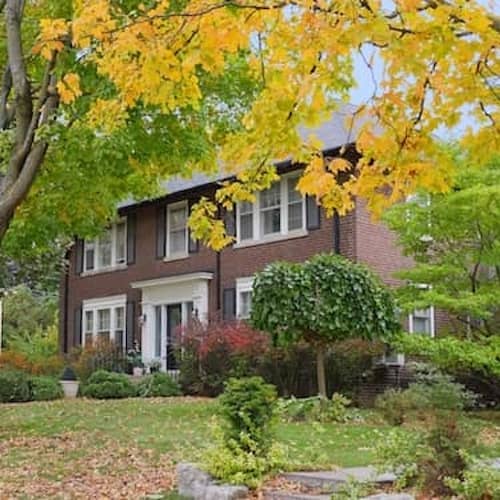What’s the average mortgage payment in Michigan?
Contributed by Sarah Henseler
Aug 21, 2025
•6-minute read

The average mortgage payment in Michigan is $1,439 for a 30-year fixed mortgage with a 6.78% interest rate, based on Rocket Mortgage® internal data.
What you can expect to pay will vary based on factors like the loan amount, mortgage rate, and loan term. If you have an escrow account, as many do, your property taxes and homeowners insurance are included.
Michigan home prices have gone up each of the last several years due to lack of inventory, a pattern seen across much of the country. However, it’s much lower than the national average mortgage payment of $2,010. Whether you’re looking to move to Detroit, Grand Rapids, or Traverse City, here’s what you need to know.
Overview of the Michigan housing market
Like most of the country, the average home price in Michigan has gone up steadily over the last 5 years, and the first half of 2025. The price of the home obviously has huge implications for the average mortgage payment. Let’s look at some baseline level data from our friends at Redfin®:
|
Year |
Median sale price |
|
2020 |
$195,000 |
|
2021 |
$218,000 |
|
2022 |
$234,000 |
|
2023 |
$241,000 |
|
2024 |
$259,000 |
|
2025 (through May) |
$262,000 |
Source: Redfin Data Center
Compared to June of last year, home sales are up 3.9%, totaling 11,424 in the Mitten State. Homes were on the market for an average of 22 days, again according to Redfin. The median sale price for the month was $291,900, up 6.9% compared to the same time last year. One of the key factors driving prices up is a lack of inventory.
According to the National Association of Home Builders, monthly supply in a balanced market should average 5 – 6 months, when measuring inventory relative to the current pace of sales. In Michigan, these numbers are much lower.
|
Year |
Average months of housing supply |
|
2020 |
2.4 |
|
2021 |
1.5 |
|
2022 |
1.8 |
|
2023 |
2 |
|
2024 |
2.2 |
|
2025 |
2.4 |
Source: Redfin Data Center
Key factors influencing mortgage payments in Michigan
There are several factors that go into determining your mortgage payment including all of the following:
- Home prices: The higher home prices are when you buy, the more you can expect to pay on a monthly basis over time.
- Down payment: Subtracting your down payment from your home price gets you your loan amount.
- Interest rate: Higher interest rates mean higher payments while lower rates mean the opposite.
- Term: The longer your term, the lower your monthly payment, but the more interest you’ll pay over time.
- Mortgage insurance: Mortgage insurance is often automatic if you make a down payment of less than 20%. It comes off once you reach 20% equity with conventional loans.
- Real estate taxes: Many people have real estate taxes included in an escrow account. Michigan has the 28th highest property tax rate in the U.S.
- Homeowners insurance: According to Insurify, homeowners insurance in Michigan averages anywhere between $2,000 – $3,000 per year.
- Homeowners association dues: This isn’t usually directly included in the mortgage payment, but it’s something you have to consider if you live within a homeowners association.
How to calculate your mortgage payment
When it comes to calculating your mortgage payment, there’s a formula that lenders use:
M = P × ((I × (1 + I)T) ÷ ((1 + I)T – 1))
This formula will help you calculate your mortgage payment based on the loan principal and interest before taxes, along with homeowners insurance and HOA fees. If the formula feels a little intimidating at first, you’re probably not alone in how you perceive it.
Here’s the breakdown:
- M = Monthly payment: This is what you’re solving for.
- P = Principal amount: This is the loan balance, or the amount you’re trying to pay off.
- I = Interest rate: Remember, you’ll want to use the base interest rate and not the APR. Additionally, your mortgage interest rate is an annual interest rate that represents the interest that’s supposed to be paid monthly over the course of the year, so you’ll need to divide this by 12 to get the monthly interest rate.
- T = Term (in months): This is the total number of payments in your loan repayment term. For instance, if it’s a 30-year mortgage with monthly payments and you always pay the minimum amount, you’ll make 360 payments.
But the Motor City put the world on wheels with the assembly line. Michiganders are built on efficiency and working smarter, not harder. It’s much easier to use a mortgage calculator. You can also check out our home affordability calculator and down payment calculator.
Let’s run through a couple of mortgage payment scenarios. We’ll look at houses in Detroit and Grand Rapids assuming a 10% down payment and 6.75% interest on a 30-year fixed loan.
The average home price in Detroit was $111,000 in June, according to Redfin. With the other loan parameters, that breaks down to $788 a month, with $648 in principal and interest, plus $84 for property taxes, and $56 for homeowners insurance.
In Grand Rapids, the median sale price was $303,750 in the same time frame based on Redfin data. That works out to a monthly payment of $1,994. There are $127 in monthly taxes and $94 in homeowners insurance premiums to go along with $1,773 in principal and interest.
Regional differences in mortgage payments: How does Michigan compare?
You might wonder how Michigan compares with nearby states in the Great Lakes region. Let’s take a look at mortgage payments in Michigan vs. its neighbors to the south and west.
|
State |
Mortgage payment |
|
Michigan |
$1,439 |
|
Ohio |
$1,575 |
|
Illinois |
$1,618 |
|
Wisconsin |
$1,683 |
|
Indiana |
$1,701 |
Source: Rocket Mortgage internal data
What about states with similar population numbers based on the U.S. Census 2024 estimates?
|
State |
Population |
Mortgage payment |
|
Georgia |
11,180,878 |
$1,672 |
|
North Carolina |
11,046,024 |
$1,859 |
|
Michigan |
10,140,459 |
$1,439 |
|
New Jersey |
9,500,851 |
$2,312 |
|
Virginia |
8,811,195 |
$2,036 |
Rocket Mortgage internal data and U.S. Census Bureau
Monthly mortgage payments by county
Mortgage payments can vary based on where you’re looking to purchase, whether it’s an urban, suburban, or rural area because location impacts the price of real estate. But the mortgage payment isn’t the only thing to think about.
For example, Detroit has higher than average homeowners insurance costs when compared to the rest of the state. Of course, shopping providers could help you lower your monthly payment. With that in mind, let’s look at the mortgage costs in the most and least populated areas of the state:
|
|
County |
Mortgage payment |
|
Most Populated |
Wayne |
$1,339 |
|
Oakland |
$1,918 |
|
|
Macomb |
$1,818 |
|
|
Kent |
$1,695 |
|
|
Genesee |
$1,134 |
|
|
Least Populated |
Schoolcraft |
$1,158 |
|
Baraga |
$1,464 |
|
|
Luce |
$646 |
|
|
Ontonagon |
$488 |
|
|
Keweenaw |
$1,464 |
|
|
|
|
Source: Michigan government population figures and Rocket Mortgage internal data
Michigan-specific mortgage resources
The Department of Housing and Urban Development (HUD) maintains a list of resources specific to those looking to buy or already owning a home in Michigan. You may find additional resources through the Michigan State Housing Development Authority including mortgage credit certificates to allow you to save money on your federal taxes.
Before making use of any resources from state authorities or nonprofit groups, make sure your lender accepts them. Many lenders, including Rocket Mortgage, don’t accept programs that require your mortgage to be a subordinate lien.
Open to qualifying home buyers nationwide, you can also look into One+.1 This option allows those who make 80% or less of the area median income where they’re looking to buy the opportunity to get into a home with as little as 1% down while we give them 2% equity to get started on loan amounts up to $350,000.
The bottom line: What you’ll pay each month as a Michigan homeowner depends
While it’s useful to understand the average mortgage payment in any state as a baseline for the level of spending you can expect, your individual mortgage payment is going to depend on your down payment, loan amount, and interest rate along with taxes and insurance.
While it’s not possible to predict what’s coming next in any event with certainty, Michigan homeowners can prepare themselves to succeed even in rising interest rate environments by focusing on the payment they can afford rather than the rate itself.
Are you ready to get started? Apply online with Rocket Mortgage.
1Client will be required to pay a 1% down payment, with the ability to pay a maximum of 3%, and Rocket Mortgage will cover an additional 2% of the client’s purchase price as a down payment, or $2,000. Maximum grant amount is $7,000. Offer valid on primary residence, conventional loan products only. Maximum loan amount of $350,000. Cost of mortgage insurance premium passed through to client effective January 2, 2024. Offer valid only for home buyers when qualifying income is less than or equal to 80% area median income based on county where property is located. Not available with any other discounts or promotions and cannot be retroactively applied to previously closed loans or loans that have a locked rate. This is not a commitment to lend. Rocket Mortgage reserves the right to cancel/modify this offer at any time. Additional restrictions/conditions may apply.
Kevin Graham
Kevin Graham is a Senior Writer for Rocket. He specializes in mortgage qualification, economics and personal finance topics. Kevin has passed the MLO SAFE exam given to mortgage bankers and takes continuing education courses. As someone with cerebral palsy spastic quadriplegia that requires the use of a wheelchair, he also takes on articles around modifying your home for physical challenges and smart home tech. He has a BA in Journalism from Oakland University.
Related resources

5-minute read
What is the average mortgage payment?
Wondering what you can expect for your monthly mortgage payments? Learn about the average mortgage payment and the factors that affect it.
Read more

6-minute read
What is the average down payment on a house?
The average down payment on a house isn’t 20%. How much you put down depends on your loan and situation. Here’s what to know before applying for a m...
Read more

11-minute read
What is a 30-year fixed-rate mortgage?
A 30-year fixed-rate mortgage is common among homeowners who prefer stable payments. Learn more about this ...
Read more